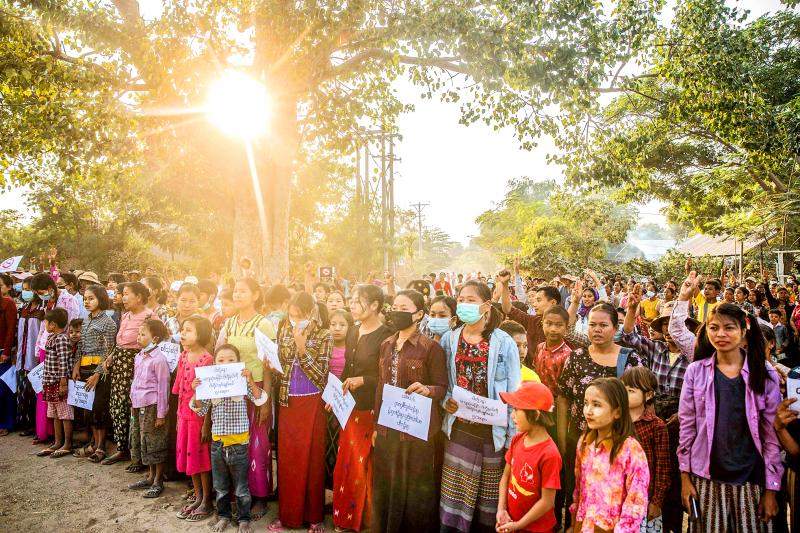The Burmese military kidnapped civilians and forced them to work as human shields, attacked homes, churches and carried out massacres, said a report warning that recent atrocities in eastern Myanmar could amount to war crimes.
The report, by the Myanmar-founded human rights group Fortify Rights, documents abuses by the country’s military in Karenni State, also known as Kayah State, an area that has seen intense fighting between the army and groups opposed to last year’s military coup.
The military has faced strong resistance in the state, and has responded with brutal violence in an attempt to crush opposition.

Photo: AFP
The report includes allegations that the army used civilians as human shields and as forced porters — actions that have also been reported elsewhere in the country, including in Chin State.
An 18-year-old student from Moe Bye on the border between Karenni and Shan states, told interviewers that he was taken, along with his uncle and two other men, in early June last year and used as a human shield in clashes between the military and the local armed resistance.
The group escaped after having been detained for four days, during which time they were tied up, blindfolded and tortured, the student said.
Another interviewee said that he and nine others were captured by the military and forced to porter army equipment for five days.
The Fortify Rights report, a flash report providing preliminary documentation based on interviews with 30 people, including eyewitnesses and survivors, adds to growing evidence of military abuses.
Numerous international organizations have raised concern over recent atrocities in Karenni State, including a Christmas Eve massacre of at least 40 civilians, including a child and two humanitarians working with Save the Children, near the village of Moso in Hpruso Township. The victims were killed and burned.
The Karenni Civil Society Network estimates that 170,000 civilians, more than half of Karenni State’s estimated population, have been displaced since the military seized power last year.
The UN has estimated that about 91,900 have been forced to flee their homes.
The military has targeted shelters for those who are displaced, including camps and churches, resulting in the deaths of civilians, Fortify Rights said.
Last month, the military killed at least three people, including two children, when it bombed a camp for displaced people near the village of Ree Khee Bu in Hpruso.
Banyar Khun Naung, director of the non-profit Karenni Human Rights Group, said there were no indications that violence would reduce in intensity, and that he feared shortages of food and essential supplies would worsen.
“In Karenni we can see that our socioeconomic condition has collapsed. Ordinary people, even if they are not [internally displaced people], even if they are the host community of IDPs [internally displaced persons], they can hardly survive,” he said.
“We cannot grow rice, or vegetables, we cannot trade between township to township, the online banking system has failed,” he said, adding that the supply of food and medicine to Karenni State was also being blocked by the military.

BACKLASH: The National Party quit its decades-long partnership with the Liberal Party after their election loss to center-left Labor, which won a historic third term Australia’s National Party has split from its conservative coalition partner of more than 60 years, the Liberal Party, citing policy differences over renewable energy and after a resounding loss at a national election this month. “Its time to have a break,” Nationals leader David Littleproud told reporters yesterday. The split shows the pressure on Australia’s conservative parties after Prime Minister Anthony Albanese’s center-left Labor party won a historic second term in the May 3 election, powered by a voter backlash against US President Donald Trump’s policies. Under the long-standing partnership in state and federal politics, the Liberal and National coalition had shared power

CONTROVERSY: During the performance of Israel’s entrant Yuval Raphael’s song ‘New Day Will Rise,’ loud whistles were heard and two people tried to get on stage Austria’s JJ yesterday won the Eurovision Song Contest, with his operatic song Wasted Love triumphing at the world’s biggest live music television event. After votes from national juries around Europe and viewers from across the continent and beyond, JJ gave Austria its first victory since bearded drag performer Conchita Wurst’s 2014 triumph. After the nail-biting drama as the votes were revealed running into yesterday morning, Austria finished with 436 points, ahead of Israel — whose participation drew protests — on 357 and Estonia on 356. “Thank you to you, Europe, for making my dreams come true,” 24-year-old countertenor JJ, whose

A documentary whose main subject, 25-year-old photojournalist Fatima Hassouna, was killed in an Israeli airstrike in Gaza weeks before it premiered at Cannes stunned viewers into silence at the festival on Thursday. As the cinema lights came back on, filmmaker Sepideh Farsi held up an image of the young Palestinian woman killed with younger siblings on April 16, and encouraged the audience to stand up and clap to pay tribute. “To kill a child, to kill a photographer is unacceptable,” Farsi said. “There are still children to save. It must be done fast,” the exiled Iranian filmmaker added. With Israel

Africa has established the continent’s first space agency to boost Earth observation and data sharing at a time when a more hostile global context is limiting the availability of climate and weather information. The African Space Agency opened its doors last month under the umbrella of the African Union and is headquartered in Cairo. The new organization, which is still being set up and hiring people in key positions, is to coordinate existing national space programs. It aims to improve the continent’s space infrastructure by launching satellites, setting up weather stations and making sure data can be shared across